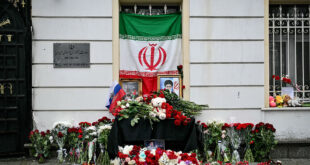The Israeli military will remain in southern Lebanon until a multinational peacekeeping force is deployed in the area, the country’s defence minister said today.
Amir Peretz said Israel would control the zone by firing at anyone who enters it.
“We have no other option … We will have to build a new security strip, a security strip that will be a cover for our forces until international forces arrive,” he told reporters.
Israeli government sources suggested the zone could be up to three miles wide, though western diplomats said they had been briefed that the zone’s depth could reach up to six miles.
The announcement came ahead of crisis talks between senior European, US and Arab officials tomorrow in Rome.
The focus of the conference, according to the Italian prime minister, Romano Prodi, will be an attempt to reach a ceasefire agreement. He today told reporters that improving the humanitarian situation and holding talks on an international force “to provide a basic level of security” were his second and third priorities.
Condoleezza Rice, the US secretary of state, who is visiting the Middle East, today reiterated the US refusal to back calls for an immediate ceasefire.
“We need to ensure that we will not return to the previous situation,” she said. “We need to begin to really lay the groundwork for an enduring peace in this region.”
At a White House news conference, the visiting Iraqi prime minister, Nouri al-Maliki, publicly repeated his call for an immediate ceasefire while standing alongside the US president, George Bush. Mr Bush said he and Mr Maliki had held “frank discussions” about Lebanon and the president voiced his support for a “sustainable ceasefire”.
The US is understood to favour the deployment of the Lebanese army along the southern border with Israel – backed up by an international force – to stop Hizbullah rocket attacks. Among proposals for an international force are an EU or Nato deployment, with a clear UN mandate.
The Lebanese government insists there must be a truce before a long-term deal is worked out. But the Israeli prime minister, Ehud Olmert, today vowed there would be no let-up in the military campaign against Hizbullah and threatened “severe measures” against the Shia Muslim guerrillas.
King Abdullah of Saudi Arabia later warned that Israel risked triggering a wider Middle East war if it did not seek a peaceful way out of the Lebanese conflict.
In quotes broadcast by Saudi state television, the king said: “No one can predict what will happen if things get out of control.”
He warned: “If the peace option fails because of Israeli arrogance, there will be no other option but war.”
His warning of a wider war was accompanied by a reiteration of the Arab peace initiative, proposed by Saudi Arabia and adopted at a 2002 Arab summit. The plan offered Israel a comprehensive peace, in return for Arab land it seized in the 1967 six-day war.
“The Arabs have declared peace as a strategic choice … and put forward a clear and fair proposal of land for peace and have ignored extremist calls opposing the peace proposal … but patience cannot last forever.”
At least 390 people in Lebanon and 41 Israelis have been killed in the conflict triggered by Hizbullah’s capture of two Israeli soldiers on July 12.
Fighting continued today as Israeli troops tightened their grip on the southern Lebanese town of Bint Jbail and Hizbullah fired at least 70 rockets into northern Israel.
In Haifa, a volley of more than a dozen missiles hit a bus and a house. Five people were injured, one seriously, and one man died of a heart attack after a missile landed near his home. A Lebanese family of seven was reported killed in an Israeli air strike.
Mr Olmert today acknowledged that the Israeli offensive had caused humanitarian problems and said he would work with the US to try to alleviate them. Up to a fifth of the Lebanese population is thought to have been displaced by the past two weeks’ fighting.
“We are aware of the state of humanitarian affairs of the population of Lebanon as a result of the brutality of Hizbullah,” he said in a press conference with Ms Rice.
“I think I can say in complete sincerity, that Lebanon and Israel are both victims of this brutal terrorist, murderous organisation.”
King Abdullah also decreed donations totalling $1.5bn (£810m) be made to Lebanon. Saudi Arabia has assigned $500m for the reconstruction of Lebanon, and $1bn to be deposited in Lebanon’s central bank to support the economy. The king also ordered a grant of $250m to the Palestinians.
Ms Rice later held talks in the West Bank city of Ramallah with the Palestinian president, Mahmoud Abbas. Afterwards, she said she had no doubt that certain groups wished “to strangle a democratic and sovereign Lebanon in its crib”.
“It is time for a new Middle East,” she said. “It is time to say to those that don’t want a different kind of Middle East that we will prevail. They will not.”
In Gaza, Palestinian militants fired homemade rockets at the southern Israeli town of Ami-Oz, wounding one person.
 Eurasia Press & News
Eurasia Press & News



